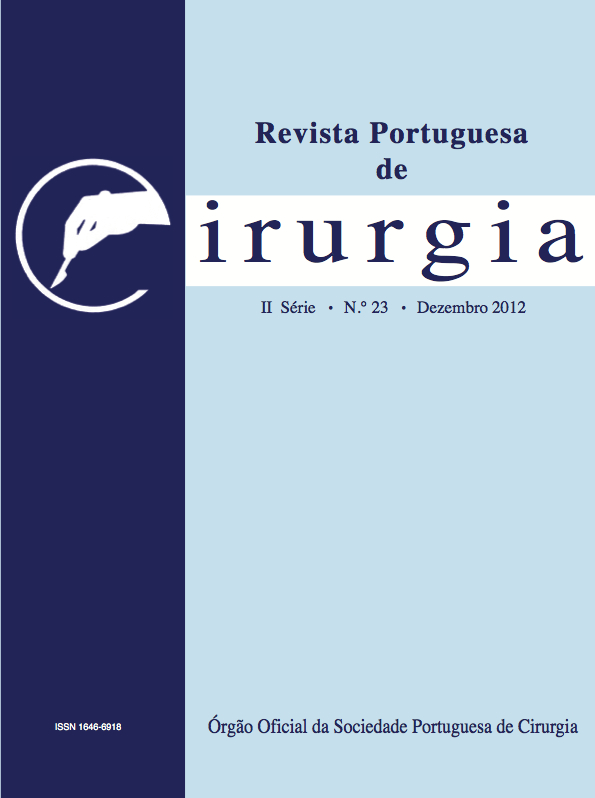Intrahepatic Colangiocarcinoma
Abstract
Introduction: intrahepatic cholangiocarcinoma (CCIhp) is a rare malignant tumor usually diagnosed at an advanced stage. This study intends to assess the treatment results of CCIhp and to define the prognostic factors of survival in treated at our department. Material and methods: Twenty-one patients undergoing treatment for CCIhp in recent years, of which eleven were operated with curative intent: four left hepatectomies, two left hepatectomies extended to segments V and VIII, two right hepatectomies, two bisegmentectomies and a trisegmentectomy. Results: Perioperative mortality was 0%, postoperative (three months) 6%. The cumulative survival rates at 5 years were 14% in the total population, 26% in patients who underwent curative surgery and 26% for the disease free cumulative survival. There was recurrence in five patients, which was diagnosed at 1.09 ± 0.82 years (range: 0.24 to 2.08). Factors that influenced the overall survival of patients were surgery with curative intent (p=0.028), presence of vascular invasion (p=0.002) and alkaline phosphatase at diagnosis (p=0.044). Among patients operated with curative intentions, the presence of vascular invasion influenced overall survival (p=0.025) and disease-free survival (p=0.002). Conclusions: Surgical treatment with curative intent was the only one who enhanced survival of patients with CCIhp. However, as the diagnosis is usualy late, only a small percentage of these patients may benefit from this treatment.
Keywords: Intrahepatic cholangiocarcinoma; prognostic factors; treatment.
Downloads
Downloads
Published
Issue
Section
License
Para permitir ao editor a disseminação do trabalho do(s) autor(es) na sua máxima extensão, o(s) autor(es) deverá(ão) assinar uma Declaração de Cedência dos Direitos de Propriedade (Copyright). O acordo de transferência, (Transfer Agreement), transfere a propriedade do artigo do(s) autor(es) para a Sociedade Portuguesa de Cirurgia.
Se o artigo contiver extractos (incluindo ilustrações) de, ou for baseado no todo ou em parte em outros trabalhos com copyright (incluindo, para evitar dúvidas, material de fontes online ou de intranet), o(s) autor(es) tem(êm) de obter, dos proprietários dos respectivos copyrights, autorização escrita para reprodução desses extractos do(s) artigo(s) em todos os territórios e edições e em todos os meios de expressão e línguas. Todas os formulários de autorização devem ser fornecidos aos editores quando da entrega do artigo.



